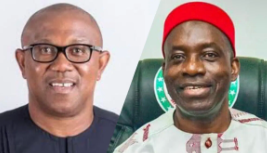By Atoyebi Nike
13th May 2025
Southeast Nigeria, particularly Anambra State, has produced a remarkable array of individuals with the qualifications and expertise necessary to lead the nation, whether as president or in other high-profile governmental roles. The era of President Olusegun Obasanjo (1999-2007) saw numerous technocrats of Anambra origin rise to prominence, including the current Governor of Anambra State, Prof. Charles Chukwuma Soludo, who served as Governor of the Central Bank of Nigeria, alongside other luminaries such as Dr. Dora Akunyili, Dr. Ngozi Okonjo-Iweala, and Obiageli Ezekwesili.
In the early 2000s, the Southeast’s political elite largely embraced the Peoples Democratic Party (PDP), but a seismic shift occurred in 2002 when Chekwas Okorie founded the All Progressives Grand Alliance (APGA), with the backing of the late Dim Chukwuemeka Odumegwu Ojukwu. Ojukwu, a staunch proponent of Southeast unity, used APGA to lay the groundwork for future political influence, even though his 2003 presidential bid was not aimed at victory, but at positioning the region for greater national relevance.
Ojukwu understood that a politically fragmented Southeast would remain powerless on the national stage. His belief in coalition-building was rooted in the reality that no single region could independently produce a president. APGA became a key player in this strategic plan, uniting Southeast voters under a common banner. At one point, APGA even held sway in Imo State with the election of Rochas Okorocha. However, the 2023 presidential election presented the Southeast with a golden opportunity for consolidation—one that was derailed by the actions of Peter Obi, the former governor of Anambra State.
Obi, initially elected under APGA, made headlines when he defected to the PDP and later to the Labour Party, ultimately running for president in 2023. This decision shattered the hopes of many who believed that a unified Southeast under the APGA banner could form a strong political alliance with other regions. The result was a fragmented political landscape, with Obi’s Labour Party, despite its popular support, lacking the broad coalition necessary for a credible presidential run.
Governor Soludo, Obi’s successor and the current leader of Anambra, has consistently criticized Obi for what he perceives as a betrayal of Ojukwu’s vision. Soludo, who himself harbors presidential aspirations, argues that Obi’s departure from APGA to pursue his personal political goals has set back the Southeast’s long-term ambitions. In Soludo’s view, if Obi had remained with APGA, Southeast votes could have solidified a powerful regional coalition, positioning the Igbo people as strong contenders for the presidency in 2027 or 2031. Instead, Obi’s individualistic strategy has left the region divided and politically weaker.
This rift highlights the deeper ideological divides within Southeast politics. Soludo, along with other APGA stalwarts, believes that power requires strategic planning, consultation, and patience—qualities that Obi, energized by youthful enthusiasm, overlooked in his pursuit of electoral victory. Obi’s reliance on populist soundbites and unsubstantiated claims during his 2023 campaign has only intensified the disarray within the Labour Party, leaving his future political trajectory uncertain.
For now, the political wall between Soludo and Obi remains firmly in place, fueled by a clash of visions for the future of Southeast Nigeria. The once-promising path to national leadership now seems far less certain, as both men continue to battle for the hearts and minds of the region’s electorate.
